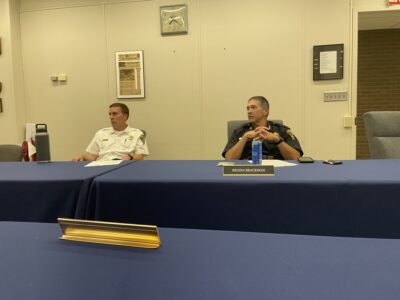Building Tomorrow: A Legislator And A Grade School Lead the Way
A few days after the death of Charlie Kirk–a time when many of us were reeling with grief and confusion, I found myself visiting a few different classrooms at Fletcher Elementary, where the calm was truly a wonderful thing. On one of my stops, children were gathered in the library, busy picking out books. The librarian moved quietly overhead with a soft voice, guiding the students with gentle and undeniable care. And in turn, they lined up quietly, holding their new books on football or wildlife, ready to head back to their classrooms.
Outside the library, pictures painted by children showcasing their dreams and hopes hung in long hallways. In this space, you could almost believe that order wasn’t just a distant idea–but something being built, daily, brick by brick.
The teachers I met held, almost instinctively, the same idea of the kind of environment children deserve. That idea framed their choices–how they spoke, how they listened, how they moved through each day. It hung invisibly over the school like a compass pointing north. And I couldn’t help but think: if peace can be built in these hallways, then perhaps it can be built beyond them, too.
The staff at Fletcher face challenges: lingering setbacks from the pandemic, a rising tide of autism diagnoses, and the strain of poverty. But they do not look away. Instead, they lean in–designing classrooms where many obstacles can be named, faced, and changed. Their quiet goal is simple but profound: that every child who walks through those doors leaves believing they can learn.
Fletcher Elementary doesn’t do this work alone. The school draws on state and federal support like Title I funding, special education services, and COVID-recovery programs, along with oversight from New York’s Office of Children and Family Services. At the local level, groups such as Chautauqua Striders provide after-school tutoring and mentoring, while community service providers bring mental-health counseling right into the building. Together, these layers of support help Fletcher staff tackle the steep challenges some of their students face. It takes a village, that’s for sure, but providing the right environment for learning, and a place where students feel safe and happy–that comes from leadership and staff.
Kudos to all of you. I enjoyed my visit. It renewed my faith in people and what is still possible in education.
The same week, Legislator Dalton Anthony came over for a visit. He’s the youngest person to serve in the Chautauqua County Legislature, stepping into public life with the energy and attentiveness of someone who still believes government can listen and respond.
Before being elected to the legislature last year, he served as a councilman in the Town of Carroll–the youngest ever elected there. He cut his teeth working on local budgets and listening at town meetings, and he still speaks of government as a service job: you show up, you listen, and you try to help. That spirit now carries with him into the county legislature, where he is learning the balance between responsibility for the big picture and attention to the people back home.
We talked about young people holding office, or young people like Kirk who feel a call to lead before the world thinks they’re ready. Sometimes that call looks like speeches and headlines; other times it looks like showing up at town meetings or raising your hand to serve on a local board. However it comes, it asks the same thing: to step into the arena, to shoulder responsibility, and to keep faith that their voice will carry.
Most interesting were his thoughts on poverty in the county. And while he said he hates to point fingers at state government, one of his biggest frustrations is with state subsidies, like welfare and food stamps. “The entire system needs to be reassessed, ” he said. He pointed out that a person can work just twenty hours a week and still exceed the income level for food stamps.
“Where is the motivation to go to work?” he asked. He believes the state must restructure and take into account how income and inflation levels impact people’s lives.
Dalton, a Republican, pointed to young families who are capable of working but receive benefits, and senior citizens who have worked their whole lives but don’t qualify for extra benefits beyond their social security. “We need more voices to let state government know where we stand on this.”
I asked him if we need more Charlie Kirk’s and Dalton Anthony’s in the country and he nodded yes. “We need more people who stand firm in their beliefs and become strong voices and leaders,” he said.
We talked about values and how people are often afraid to state what’s important to them. I asked him what his values are and he mentioned family and church. But his last answer really stuck with me: he talked about self-responsibility and the importance of young adults taking pride in a life that they build. It’s a theme he alluded to several times in our discussion.
It seems to be a call to his generation and those up-and-coming generations. And not just a call but a challenge–to rise above cynicism, to take responsibility when it would be easier to stand aside, to take pride in building a life that is their own. In a world where many hesitate to name their values, Dalton Anthony’s steady insistence on family, faith, and self-responsibility feels like a reminder: the future isn’t handed down, it’s carried forward–one young leader, one determined voice, at a time.


